Gripped by every measure
Frieder Bernius on his complete recording of Mendelssohn’s sacred music
It was pure coincidence. In summer 1972, in the middle of my studies for my degree, I moved from a Stuttgart suburb to the west of the city, just half a kilometer from the Graulich family home and the head office of Carus-Verlag. Günter Graulich was then closely involved with editions in the Stuttgart Schütz Edition, for 1972 was a special year in the history of Heinrich Schütz – the 300th anniversary of his death. At that time I was not so very interested in the music of Heinrich Schütz, having grown up with him alongside Bach and his contemporaries. This may have been because the essential qualities of Heinrich Schütz were then rather obscured by the overly Romantic ways of singing and playing still typical at that time, and the use of a group of singers which was simply too large.
At that time I was much more interested in the choral music of German Romanticism, works by Mendelssohn and Brahms. It was precisely their historical approach to contrapuntal vocal music which was a bridge for me to what I had learned in my “musical puberty.” Their compositional style developed into what became my preferred style towards the end of my studies. During my studies I had heard, particularly with regard to Mendelssohn, only derogatory, even ridiculing opinions.
And so it came about that the “thousand year” performance ban on Mendelssohn’s music stipulated by the Nazis lasted only about three times as long as their disastrous dozen years in power. Only at the beginning of the 1970s did an unprejudiced examination of Mendelssohn’s vocal works begin. I can still remember exactly how I tried to find kindred spirits, swimming against a strong tide, undermined by the rejection of this music which was then regarded as too bombastic or as a pure stylistic copy.
My very first radio recording and second LP recording in the mid-1970s were devoted to Mendelssohn’s works – admittedly neither with music from Carus-Verlag nor for its record label, which had just been launched. However, the recordings led to an initial interest in my work at that time by the publisher Günter Graulich.
One of the fundamental precepts of the publishing house is to encourage a wide interest in different works through music editions and recordings of the same work. In the late 1980s Günter Graulich invited me to record all of Brahms’s unaccompanied sacred works. I passed on this generous, kind offer to my choir – and had to concede that after its first two recording projects, the ensemble was tired of making recordings. So I had to decline. This resulted in a recording by Roger Norrington which has been in the Carus catalog ever since, and was only joined by our new recording in 1995.
Our first recording for Carus was therefore devoted to the secular choral music of the German composer and music teacher Karl Marx (1897–1985). Now we began to work together closely once more: Carus wanted to publish the “complete sacred works of Mendelssohn” and to issue large parts of this on recordings. In 1976, four years after the publishing house was founded, Günter Graulich himself edited the first Mendelssohn publication in the Carus catalog with the organ version of the famous hymn Hör mein Bitten. And now came the plan for a complete edition of his sacred music, accompanied by a complete recording: what a project! And, from the perspective of the early 1980s, what a risk!
“Felix Mendelssohn Bartholdy has left us his most significant creations in his many compositions of sacred vocal music.” This was the assessment of Hermann Kretzschmar in his 1895 concert guide Führer durch den Konzertsaal. Why should the precocious composer of a few well-known works, such as the Octet or the Overture to A Midsummer Night’s Dream, not have also written important vocal works? However, a more thorough examination of Mendelssohn’s vocal works was always overshadowed by an undue emphasis on his role in reviving Bach’s St Matthew Passion, or by prejudices about his Jewish background.
From the very beginning I was as enthusiastic about the idea of a complete recording as I am gripped by almost every measure of this composer’s work (and the proviso “almost” is the same reservation that applies to every great composer: that alongside the outstanding works, there are also weaker ones). In 1983, just a year after the release of the very first compact disc on the German market, we released the first Carus CD (Mendelssohn’s Hör mein Bitten and other sacred works, Carus 83.101), marking the beginning of this ambitious and extensive project.

Frieder Bernius is in great demand worldwide as a conductor, seeking a sound which is both authentic and at the same time distinctive and personal – whether in the vocal works of Monteverdi, Bach, Handel, Beethoven, Schütz, or Ligeti, the incidental music of Mendelssohn, or the symphonies of Haydn and Schubert. Bernius has conducted the complete recording of the sacred vocal music of Felix Mendelssohn Bartholdy and many other recordings of works by a huge variety of composers, and is also editor of many music editions published by Carus-Verlag, including Mozart’s Mass in C minor KV 427.
“… Phenomenal: Mendelssohn’s sacred music with the Stuttgarter Kammerchor … no superlative is wasted in praise of this
choir. From the Baroque to Ligeti’s intricate ramifications of sound it has developed a sensibility, a language of colors, in which Mendelssohn’s music is now illuminated. Through this Complete Recording, not only the view of the composer will be changed for a long time“ DIE ZEIT
Felix Mendelssohn Bartholdy
Sacred Choral Works
Carus 83.020
Felix Mendelssohn Bartholdy
Oratorios
Carus 83.021
A complete recording and complete edition of the vocal works went hand in hand with each other: 38 works by Mendelssohn were published for the first time ever, and many recorded for the first time. One recording which is still particularly vivid for me is that of Lauda Sion in June 1996 in the Protestant Church of St. Johannes in Schwaigern. In the 19th century edition still then in circulation, the fugue “Sub diversis specibus” (No. 6) is missing. Research revealed that although Mendelssohn had initially discarded the fugue, he had later reincorporated it. In the new edition published by Carus it was once again included in the complete work, and in my recording – which we were in the process of making – we were able to include it at very short notice. And I recall how Günter Graulich casually told me about an unpublished orchestral version of the hymn Hör mein Bitten, composed in 1844, which he had just become aware of: I was immediately full of enthusiasm for this version – for some time I had become very interested in orchestral scores and colors, and while I was transcribing the work from the autograph manuscript, I was able to make interesting comparisons between the organ version and the composer’s intentions in orchestrating the work.
Since then a total of twelve CDs containing all of Mendelssohn’s church works have been released and in 2013 the edition was completed with the release of two box sets: a long period of time over which interpretative approaches naturally change. The complete recording of Mendelssohn’s sacred vocal works, meanwhile complemented by recordings of his three incidental music works, has allowed my interpretations of his outstanding vocal compositional technique and his fine art of orchestration to mature over 25 years of artistic study. Paying close attention to the composer’s metronome markings helped me to get closer to his aesthetic intentions. And it proved to be the case that interpretative experience with the complete vocal works can cast light on the major oratorios Lobgesang (Symphony no. 2), St Paul and Elijah.
In the meantime we now have an overview of Mendelssohn’s complete Œuvre of sacred vocal music in scholarly music editions and recordings. Over 200 years after Mendelssohn’s birth, we now have a truly thorough (re-)evaluation of this part of his compositional output, which has long been necessary.
Felix Mendelssohn Bartholdy
Ingenious Music
Carus 83.022

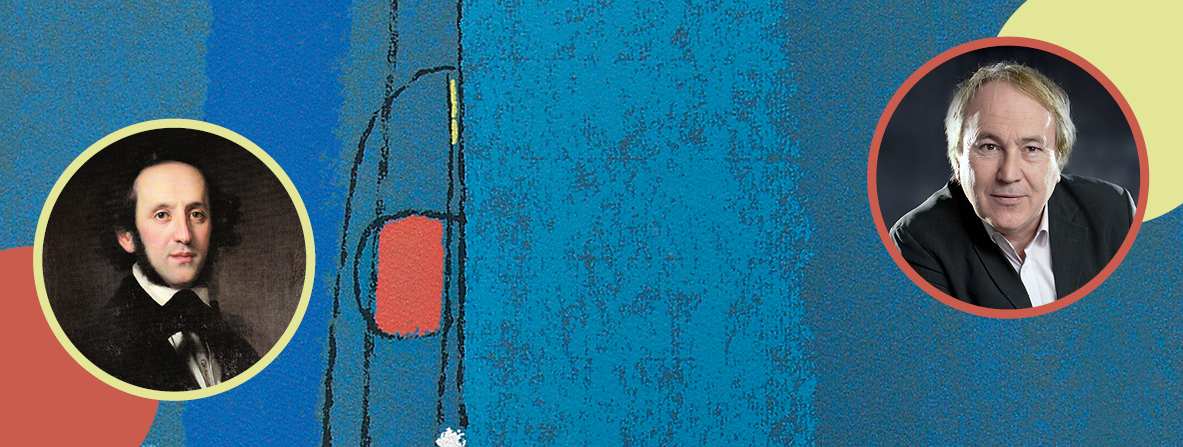
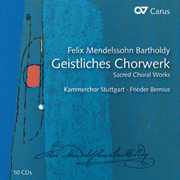
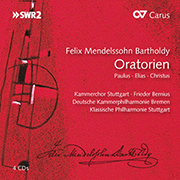
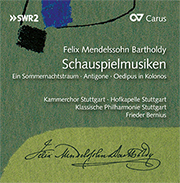
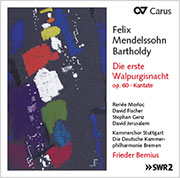
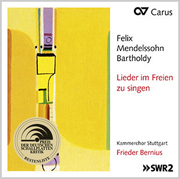


Leave a Reply
Want to join the discussion?Feel free to contribute!